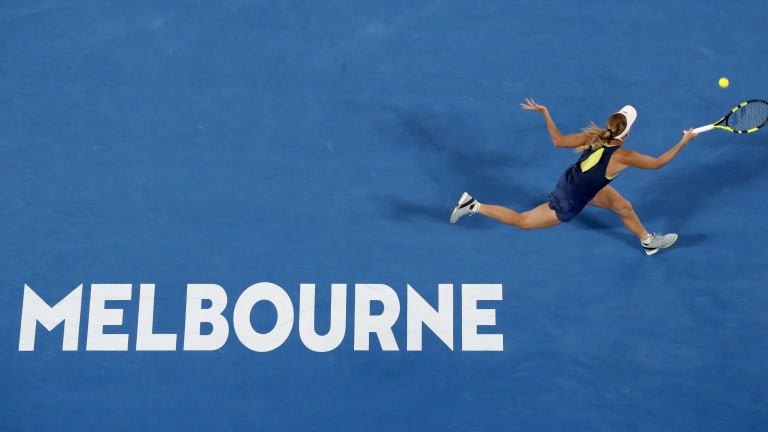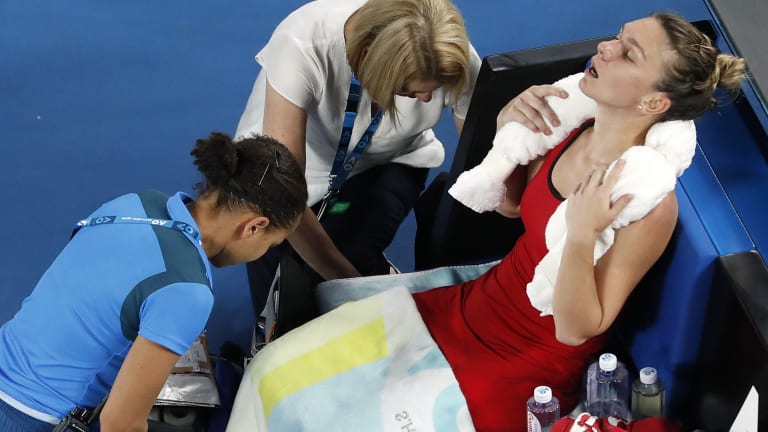As Caroline Wozniacki realized a lifelong dream by capturing the Australian Open in a harrowing three-set skirmish against Simona Halep, it called to mind the words of the esteemed journalist Pete Hamill. He once wrote, “The true athlete teaches us that winning isn’t everything, but struggle is—the struggle to simply get up in the morning or to see hope through the minefields of despair... In life, defeat and victory are inseparable brothers.”
Hamill’s outlook on sports and the larger game of life was exemplified by both Wozniacki and Halep throughout their long struggle for survival in one of the most hard fought and compelling women’s major finals I have seen over the past decade. In this 2:49 confrontation on Rod Laver Arena, the laudable Wozniacki secured the first set, dropped the second, built two significant early leads in the third, but ultimately had to rescue herself when she was twice six points from defeat in the final set. Wozniacki’s iron will, supreme discipline and extraordinary composure enabled her to stop a determined Halep, 7-6 (2), 3-6, 6-4.
The stakes for this first Grand Slam tournament final of 2018 were even more substantial than is normally the case on such occasions. Here was the No. 2 seed from Denmark colliding with the top seed from Romania. They were playing for the No. 1 world ranking. They were each fighting for their first major title after losing two previous finals at the Grand Slam events. Not since Victoria Azarenka toppled Maria Sharapova in the 2012 Australian Open title round contest had the No. 1 ranking been up for grabs in a final at a Grand Slam tournament.
Never before had a woman from Denmark secured a major title in singles, and the last time a Romanian woman came through at one of the majors was when Virginia Ruzici took the crown at Roland Garros back in 1978. In the case of Wozniacki, she was competing in her 43rd career major. Only three players—Flavia Pennetta, Marion Bartoli and Jana Novotna had appeared in more Grand Slam tournaments before making the breakthrough and claiming a first singles title. Halep, too, had been in pursuit of the most prestigious prizes for a very long time; this was her 31st major.
At the outset, Wozniacki was setting the tempo and ruling from the backcourt with uncanny ball control, depth and precision. She was utterly controlling the proceedings. The 27-year-old held at 15 in the opening game, and then broke Halep at 30 with three outright winners in that game—including two with her trademark two-hander down the line. Perhaps more than any other shot, the backhand down the line took Wozniacki into the victory column.
Wozniacki was up 2-0, and soon she held at 30 for 3-0 with a forehand crosscourt winner. Her mastery in the rallies was unassailable. Her cool authority was strikingly evident. In those first three games, she took 12 of 17 points. Halep found her bearings in the fourth game with a love hold. But the top seed was making almost no impression on Wozniacki’s serve as the Dane backed up her delivery convincingly on her way to a 5-2 lead. In four service games, Wozniacki had won 16 of 21 points with clean efficiency.
Yet Halep was not ready to concede the set. She held at 30 for 3-5. Serving for the set, Wozniacki was exceedingly tight. She drifted to 15-40, served an ace, but lost that game at 30 on a timid sliced forehand down the line that landed long. Halep was back in business. Now hitting out much more freely off the ground, serving with improved accuracy, covering the court with alacrity, Halep released two aces and held at love. To 5-5 she travelled.
Both players held to set up a tie-break. Halep seemed to have the momentum on her side of the net as she headed into that crucial sequence, but it was Wozniacki who was the far superior player. She opened with a forehand swing volley winner, and soon established a 2-0 tie-break lead. Halep took the next point but Wozniacki was unwavering. She moved methodically to 4-1, dropped the next point and then advanced to 5-2 with a well struck forehand down the line, followed by a backhand down the line. A hurried Halep missed off the forehand on the run. It was 5-2 for Wozniacki. She promptly took both points on her serve to win the tie-break 7-2. Wozniacki did not drop a point on her serve in the tie-break.

